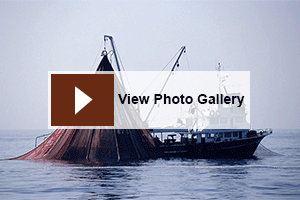The Global Ocean Commission
Beyond 200 nautical miles from the seashore lie the international waters of the high seas global commons covering 45 percent of the Earth’s surface.
The time is ripe for a new initiative of great vision and leadership to protect the largest and last remaining global commons on Earth.
The time is right for a Global Ocean Commission.
The high seas evoke images of three-masted ships on voyages of trade and discovery, of days when early explorers reached distant lands and began to map the globe. Yet only in very recent times have we have begun to chart the world under the sea, to comprehend its importance to life on Earth, and to attempt to direct its use.
From the Polar seas to the underwater abysses and the wide-open sweep of the Pacific, the ocean plays a vital role in the processes that regulate the world’s climate and sustain life. Tens of millions of people depend directly or indirectly on fishing for their livelihoods, and fish is their main source of protein for more than 1 billion people.
 Human activities, on and under the sea, that take place within a country’s waters (the exclusive economic zone, or EEZ) are bound by state, regional, and international laws, although these are often flawed and ineffective.
Human activities, on and under the sea, that take place within a country’s waters (the exclusive economic zone, or EEZ) are bound by state, regional, and international laws, although these are often flawed and ineffective.
The immense growth in demand for natural resources- from fish products to natural gas to rareearth metals - coupled with huge strides in fishing technology and deepwater mining and exploration, mean that human exploitation is reaching further and further beyond the EEZs into what is known in law as the high seas.
This new frontier, less studied than the solar system yet covering 45 percent of the Earth’s surface, is virtually free of effective governance. Its exploitation epitomises what is known as the tragedy of the commons: a resource used freely by all, but owned and protected by no one.
International law governing the use of the high seas is imperfectly formed, poorly applied and inadequately overseen. The most comprehensive legal framework for the management of the high seas, the United Nations Convention on the Law of the Sea (UNCLOS 1982), has been ratified by more than 160 nations but has not succeeded in protecting this vital life system.
Unsustainable levels of fishing, destructive fishing methods, and pollution are combining with the twin blights of climate change - acidification and rising sea temperatures - to degrade our ocean to a point from which it may not recover.
Yet our understanding of the importance of, and threats facing, our shared ocean, both among decision-makers and the public at large, remains extremely limited. The health of the ocean - and in particular the high seas - is in jeopardy. The time has come to raise awareness and to act.
A central issue is that international governance has not kept pace with developments in extractive technologies, or with advances in scientific understanding of the global ocean’s central role in the Earth system and the challenges to it.
At a time when the health and productivity of the ocean are of increasing concern, the Global Ocean Commission can ensure that these issues receive the high-level attention that they deserve, and catalyze changes that will be critical for the billions of people who depend on the global ocean for food, livelihoods, and well-being.
The Commission brings together global leaders to analyse the main challenges and threats to the high seas, develop recommendations for addressing them, and feed those recommendations to institutions and processes that can implement change. It will seek evidence and views from all relevant sectors of society, including business, economics, science, security, and conservation. This process will ensure that its recommendations balance the needs of high seas users with the imperatives of science and sustainability.
The Commission’s work will focus on four main tasks:
- Examine key threats, challenges, and changes to the ocean in the 21st Century and identify priority issues.
- Review the effectiveness of the existing legal framework for the high seas in meeting the unique challenges and threats of the 21st Century and beyond.
- Engage with interested parties around the world, including groups of people with direct interests in ocean issues as well as the general public.
- Make recommendations regarding cost effective, pragmatic, and politically feasible reforms of high seas governance, management, and enforcement.
.jpg)
The Global Ocean Commission originated as an initiative of the Pew Charitable Trusts, in partnership with Somerville College at the University of Oxford, Adessium Foundation and Oceans 5. It is supported by the Pew Charitable Trusts, Adessium Foundation and Oceans 5, but is independent of all. It is hosted by Somerville College.











